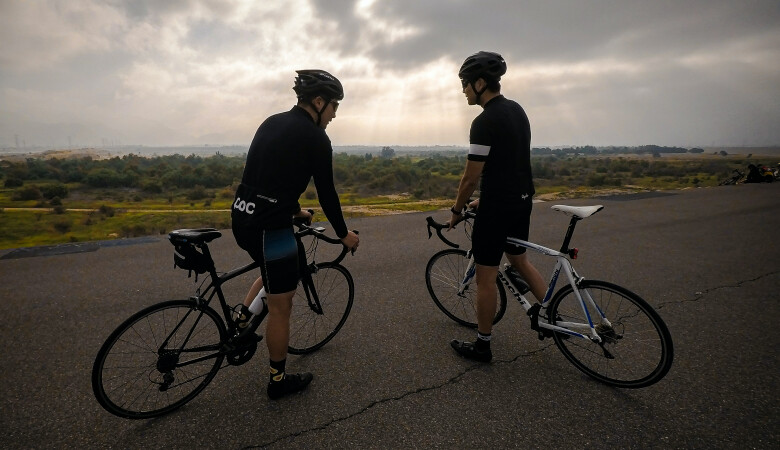God-Centered Hope Expels Godless Hedonism (Philippians Sermon 18 of 24)
February 29, 2004 | Andy Davis
Philippians 3:17-21
Joy, Works of the Flesh, Idolatry
Andy Davis preaches a verse-by-verse expository sermon on Philippians 3:17-21. The main subject of the sermon is how a God-centered mindset extinguishes sinful desires.
- SERMON TRANSCRIPT -
Introduction: Two Great Drives in the Universe
As I thought earlier in this week about the most famous and most expensive bowl of stew in history, I was thinking it must have been incredible. I mean, it must have really tasted good. Of course, I'm talking about when Esau came in from the field and was famished and spend a day of hunting and apparently came up empty. And his stomach was calling and he smelled Jacob's stew bubbling and... I just thought it must have been incredible lentil stew. Now, I've never eaten a lentil stew that was worth selling a birthright for, but I thought it must have been an incredible stew. But then last few days, I think I changed a little bit and now I feel like it must have been probably leftovers, just heated up, because isn't it what the devil does? I mean, wouldn't that greatly honor the devil's whole scheme, is to get somebody like Esau to trade it off for a below average bowl of soup.
Isn't that in effect what C S Lewis said in, The Screwtape Letters when he said, "The whole program of the devil is to get you ever increasingly enslaved to something that ever decreasingly pleases you?" That's what he's about. And I think, therefore, it must have been leftovers, that he sold his birthright for. What a tragic thing that anybody would trade faith for something physical, that Abraham's grandson would trade it all for a bowl of soup. And I'm thinking about this, that Abraham, the great man of faith, who turned his back on a lucrative lifestyle in early Chaldeans and sold most of it, and was willing to live in tents and never get what was promised to him and just lived by faith should have a grandson like that. What a scandal. What a tragedy.
But I see around me in the country I live in, and I see within me in my own nature, the same tendency, the same drive, as it were. And that drive is strong, isn't it, brothers and sisters? And the sanctification that we're called to is in direct opposition to that drive at every moment. John Piper has clarified for us that there are two great drives in the universe, strong and powerful drives. One is the drive that each individual person has to be happy. And the second is God's drive to be glorified in and by his creation. These are strong drives, aren't they? And you cannot resist or refute your internal drive to be happy, you can't deny it. You can't say it's not there. You can do some things about it, we're going to talk about those in this message, but you can't refute it, because it's there. And whether you know it or not, the other drive predated yours and is stronger, and more powerful, God will be glorified in his creation. That's why we were created. And what John Piper's done for me and for so many others is said that in effect the two become one for the believer. We find our happiness in God's glory. We find the meeting of every need, anything that you could want, we find in God's exaltation and his glory.
The Dual Danger of Legalism and License
Now, the Apostle Paul writing this greatest probably of all thank you notes, book of Philippians, obviously has more than just thanking them for the money that he has in mind here. He is a pastor and he's concerned about these folks. The background of his concern is in the devil's relentless attack on the church. The devil is never going to let us alone, ever, for a moment our steps are going to be dogged by this enemy. And so he's always pumping out things to try to stop the work of God, and in this one chapter, Philippians, we see two of his greatest lies. And what's so interesting about them is that they're in one sense, kind of opposites of each other. I think in the end they become the same thing, just different means, but they are legalism and license. We see them both in this chapter, legalism and license. And Paul, the pastor's, concerned about both. He begins the chapter by looking at it, he's concerned about it. He says, "Watch out for those dogs, those men who do evil, those mutilators of the flesh, for it is we who are the circumcision." Now, we are the true circumcision, not those Judaizers who want to subjugate you Greeks into a system of laws and rules and regulations and sap all your joy.
"I want to tell you... " in effect, he says in Philippians 3. "I want to tell you about my own pilgrimage. I came to reject all that as trash and all of my efforts in legalism led to nothing. A joyless existence. I found something that drove all of them out, and that was I saw Christ, the resurrected Christ on the road to Damascus. I saw His glory, and there was awakened in me such a longing and desire that has never been fully quenched. I stand as a man who's satisfied, and yet never satisfied, always wanting more, but I know what it is I want. I want Christ. I want to know Christ. Even if it means suffering for me, even if it means death. I want to know him." And so that drove out any concern over legalism. I knew that my legalistic life as a Pharisee would never lead me to Christ. Actually, was leading me away because it made me proud and hard and self-righteous, and I didn't want any of that." And so he says, "Be like me, follow my example, live like me." And if, in some point, you think differently, God will make that clear to you too, okay. Because I'm not wrong about the Christian life. That's what he's saying. And so he's resisted and he's turned away from legalism. But now interestingly, he turns in verse 17 on toward the opposite error. And that's this whole issue of license. And he wants to warn them about it.
Now, we've talked the last few weeks about verse 17, "Join with others and following my example, brothers, and take note of those who live according to the pattern we gave you." Well, we kind of took that verse out and talked about it on its own merits, and saw that across Paul's writing, and really across the whole New Testament, that there's a theology of discipleship here that was worth listening to. But now I want to set the verse back in its context and understand it in Philippians 3. And he's saying, "I want you to follow my pattern because there are people around you who are living like godless hedonists, pagans, and that life leads to hell. It leads to destruction. And I want you to be warned about it." So he's a good pastor, you see. He's warning against legalism on the one side and then he's warning against license on the other. The interesting thing is that both, I think, in the end, turn out to be the same thing. Both of them are intensely me focused, aren't they? Both of them looking inward like that Pharisee that was so self-righteous in Luke and stood up and prayed about himself. "God, I thank you that I'm not like other men." Well, it's very self-focused, that legalistic self-righteous approach, but so also is the God is their stomach approach too, isn't it? Always thinking about, "My drive and what I want out of life. What my urges are and how to meet them." It's a very selfish way to live. And so we have selfishness in its religious garb, and then selfishness in its pagan garb, and it ends up about the same thing.
I. The Condemnation of Godless Hedonists
Now, when he talks about people whose God is their stomach, it's an interesting phrase, isn't it? Look at it again. He says in verse 18, "For as I often told you before, and I'll say again even with tears, many live as enemies of the cross of Christ, their destiny is destruction." Verse 19 he says, "Their God is their stomach and their glory is in their shame. Their mind is on earthly things." Now, the stomach certainly was designed by God to digest food, and it does represent food here, I think certainly. But I think it goes deeper than food. I think it represents any fleshly drive, any appetite, any lust, any desire. Frankly, anything tied to the body and to an exclusively earthly lifestyle. If your stomach is your God, it means that the center and focus of your existence is meeting your earthly drives and desires. It's why you're alive. Your free time is spent on those drives and desires. Your free mental time is spent on them as well.
Frankly, all your time is spent on it because even in your professional life, or if you're a student and you're training and preparing, you're thinking about meeting that drive and desire. The Book of Ecclesiastes says that all men's efforts are for his mouth. And what it means is there's just a focus on the earthly side of life to the exclusion of everything else. I think that's what it means if your God is your stomach. In the end, you worship only yourself, and your own body drives, and you live to meet them. That's all. Now, Esau is of course the ultimate biblical example. And so I brought into our pastoral ministry a while ago, the term, "Esauishness," which doesn't exist in the dictionary. I've looked it up, it's not there. But you know what I mean, it's what we live around all the time. America is surrounded... We're surrounded by Esaus. We're surrounded by people who live for their stomachs. And it's a very difficult thing to observe. I worked for 10 years in industry, and I just... The motive, they put up with the work week and live for the weekend.
And it's just a drive all the time toward the pleasure and toward physical delights. Hebrews 12:16 points this out concerning Esau, says, "See that no one is sexually immoral or is godless like Esau, who for a single meal sold his inheritance rights as his oldest son." And so we have these overpowering drives of the flesh. Now, there are different strategies for dealing with them. The body itself is a remarkable gift of God, isn't it? If you really think about it theologically, it is the highest pinnacle of God's physical creation. I think He made nothing better than the human body, including the human mind. It's the peak of what he made physically. And so you are amazing and intricate balance of biological systems, the circulatory system, the nervous, muscular, and skeletal systems, and the digestive system certainly, and the reproductive system, all of these things fearfully and wonderfully made, King David said. And it was a ground for praising God. It's not a bad thing. We're not Greeks saying that the body is evil and we must subject all of its strives.
Well, there are different strategies for dealing with these drives. Now, what drives are they? Well, drives for food and drink, to eat something that's delicious and drink something that's pleasing to the palette or drive for visual stimulation, for sights that are beautiful. Could be anything from a beautiful tree or flower, to a mountain, valley, or anything else that's beautiful to your eye. Drive for sexual pleasure. A good thing from God. It receives an awful lot of press, doesn't it? Even in the recent weeks, when you look at what's happening in our country about marriage, at the core of it is the drive for meeting sexual needs. The drive for sensory comfort. A comfortable blanket on a cold night, I used that even recently. I like a nice, soft, warm blanket when the weather gets like it does, and we have insufficient insulation. Working on that.
But get out of the shower and your body is dripping, nothing like a plush thirsty towel. I mean, these are the sensory things of life, and they're not evil. Skillfully-designed furniture, a couch that doesn't have a spring poking up in your back, something like that. And these are not bad things. Jesus slept on a cushion in Mark's Gospel in the back of the boat. What was the cushion there for? Well, ask him when you get to Heaven, but I think it was to make Him more comfortable. I would think you don't need to go much further than that. And the drive for pleasing sounds, whatever your favorite music is. Those are all things that are around us. Now, the problem really comes ultimately with boundaries, doesn't it? That's the issue. The issue is that God has set boundaries around these drives. He's given the drives, he's given the desires, and then he put boundaries up. Says in Psalm 16, King David says, "The boundary lines have fallen for me in pleasant places." That's a contented man, it's somebody who's happy and content with where the fences are set up in his life. But if you jump the fences, you become a transgressor. So there are fences, there are boundaries in life. Now one strategy of dealing with the fleshy drives and desires is to say, "There are no boundaries, literally, there are no fences anywhere." That's the ultimate of hedonism, the ultimate of me-ism, that I can have whatever brings me pleasure. Some people even kind of baptize this theologically and say that the death of Christ on the cross covers that so you can live any way you want. That is the grace of God transformed into a license for immorality in Jude 4. It's mentioned also in 2 Peter 2:18 and 19, it speaks of these false teachers, "They mouth empty boastful words and by appealing to the lustful desires of sinful human nature, they entice people who are just escaping from those who live in error. They promise them freedom while they themselves are actually slaves of depravity. For man is a slave to whatever has mastered him." So ironically, they are talking about freedom, but they are living like the ultimate slaves. But that's one strategy, saying that there are no fences, no boundaries, nothing, anything goes, whatever makes you happy. The other sinful strategy is legalism or asceticism. In that case, there are boundaries set much too narrowly. You're to be inside this little area here, and anything beyond it is wickedness and sin. And so these folks draw in excluding territory that God has said is good and right, such as marriage, for example, or eating, or other things.
Things that, it says in 1 Timothy, God made so that He would be thanked, that He would be honored, but they draw in the boundaries so narrowly and say, "You must live here and anything beyond it is wickedness and sin." Some of the ascetic monks, these are some of my most favorite people to study in church history like Simeon Stylites, the one who sat on a pillar six to eight feet high, to get away from everything. By the time his monk career ended, his pillar was 80 feet high, and he would stand for 20 days at a time and pray and sit for 20 days at a time and pray, and they'd give him a modicum of food and he would eat it, wishing probably didn't have to. That was a life of asceticism. The problem with that kind of asceticism is, number one, it doesn't work. Colossians 2 tells me it doesn't work. These kinds of extreme regulations, "'Do not handle, do not taste, do not touch…' These are all destined to perish with use, because they are based on human commands and teachings. Such regulations indeed have an appearance of wisdom, with their self-imposed worship, their false humility and their harsh treatment of the body, but they lack any value in restraining sensual indulgence." They don't change your heart, you're every bit as lustful as you were before, and God is looking at the heart, isn't he? So they don't work.
Secondly, in that they do work, they produce some negative effects, harsh thoughts toward God, judgmental attitudes toward others, brothers and sisters, who don't make the same commitments that you do. And so, if you decide to give up something, spectator sports, television, any kind of entertainment, computer games, vacations, I mean the list goes on and on. I actually made a list of the different ways that Americans meet their pleasure needs, and it really was amazing, cruises... I mean, we could go on and on. But if you say, "I'm going to give up all of these things." You are strongly tempted to feel negatively and arrogantly toward those who don't give them up. Well, those are different strategies. Here the focus is on Godless hedonism. Now the word, "Hedonism," comes from the Greek word, "Pleasure," Hedonis is a Greek work for pleasure. And the definition would be, whatever most increases pleasure is right, regardless of who it is it hurts.
Now Greece was the center of certain schools of philosophy concerning this, Epicurus for example, taught this, but I don't really think that Paul was looking into schools of philosophy with the Pagans that surrounded his Philippian Christians, he just said that's the way that Pagans naturally live. Whether they have it organized into a system of philosophy or not, this is what they live for, their god is their stomach.
Paul’s Four-fold Assessment of Godless Hedonism
Now, he says four things about them here, he assesses them, he says, first of all, that they are enemies of the cross of Christ. Look at that in verse 18, "many live as enemies of the cross of Christ." The center of Christ's life was the cross, that's why he came to die on the cross, he came to die, to suffer and die. And he calls on all of his followers to pick up their cross daily and follow him. If you don't carry your cross, you're not worthy of him. Jesus said it plainly. And so the lifestyle of a Christian is the lifestyle of the cross. It's what Martin Luther called the theology of the cross, of self-denial for something better, something higher, a greater joy. And Jesus did it all for joy. He wasn't that kind of Godless ascetic, and there are, by the way, ascetics in every religion, it's not just Christianity. There are some in Buddhism and Hinduism that do the same thing with the earthly drives. But he said, these people they live as enemies of the cross of Christ, they hate the preaching of the cross, and they certainly hate the lifestyle of the cross, they're enemies of the cross.
And secondly, he says, "Their end is destruction." I think end is better than the NIV's pick choice of destiny here. Destiny's a little strong. It just tell us... Which is the end, the end of that road, you living like that, the end of that road is hell. Now that there's no question. Maybe destiny too strong but hell is not too strong. From which we get the word apollyon in the book of revelation.The end is hell. The end of that lifestyle is hell. It says in Matthew 7:13, same word, "Enter through the narrow gate for wide is the gate and broad is the road that leads to destruction and many enter through it." It's the same word. Some people say the road to hell is paved with good intentions, but here it seems to say the road to hell is paved with a bunch of good times. One party after another, one good time after another.
Thirdly, he says, "They glory in their shame." Interesting expression here, I think what it means is that that which they will in the end truly be ashamed of they presently boast in and are excited about. They boast about whoever can drink the most alcohol or have the most pleasure in a variety of ways and there is a bragging and an enticing there. Puritan, Thomas Manton put it this way. He said, "First we practice sin then we defend it and then we boast of it." And that's what I think he is meaning here when he says their glory is in their shame.
And then fourthly, he says, "Their mind is on earthly matters." They think about this stuff all the time. You can't get their minds off of the earthly stuff up into the heavenly realms. They can't think about it, it's not the way they're wired. And so they are always thinking about the next exciting ball game or a sensuous night, or a great meal, or something earthy. That's what they live for. And it says in Romans 8:6, "The mind set on the flesh is death but the mind set on the spirit is life and peace." And so we see the condemnation of godless hedonists.
II. The Compassion of Paul
But let's not miss something in what Paul does here. I went right over it but I don't want you to miss it. In verse 18, he says, "For as I have often told you before, and now say again even with tears..." It's easy for Christians to miss this, isn't it? What is Paul's attitude toward the people who are living like this? Are you shattered over it? I mean, he is crying for them. There is an incredible compassion here for these folks. And this is actually a regular part of Paul's ministry. He did the same thing in Romans 9 when he's talking about Christ-less Jews, those who have not trusted in Christ.
Now, he was a Jew that had trusted in Christ but there were many who had rejected Christ. And what he says in Romans 9 is that, "I speak the truth in Christ. I'm not lying. My conscious confirms it in the Holy Spirit. I have great sorrow and unceasing anguish in my heart. For I could wish that I myself were cursed and cut off from Christ for the sake of my brothers those of my own race, the people of Israel." He is weeping for the Jews who don't know Christ. Weeping for them. Just like he is weeping here for the pagans who don't know Christ, whose God is their stomach. He's crying for them.
He does the same thing toward Christians, 2 Corinthians 2:4, he had to write a very harsh letter dealing with sin, 1 Corinthians 5 covers it and he wants them to know it was not easy for him to write that disciplinary letter. And so he says in 2 Corinthians 2:4, "I wrote you out of great distress and anguish of heart and with many tears not to grieve you, but to show you of the depth of my love for you."
And he just sums up his whole ministry to the elders of the Ephesian church in Acts 20 verse 31 he says, "So be on your guard. Remember that for three years I never stopped warning each of you night and day with tears." The tears of Paul here, his great compassion. And it was really the tears of Christ because he is patterning it after Christ who stood over Jerusalem and wept over the city. "Oh, Jerusalem, Jerusalem, you who kill the prophets and stone those sent to you, how often I have longed to gather your children together as a hen gathers her chicks under her wings but you would not."
The compassion of Christ for the lost is coming out in his apostle. The tears that he weeps here. Ultimately, though, I think his compassion is towards Christians, isn't it? Because he says, "As I have often told you before and now I say again even as tears, many are living in this godless pagan way." Don't do it Philippians, please. Don't live that kind of life. So his compassion is really ultimately for the Philippians here. Although he does grieve for the pagans.
III. The Conduct of Citizens of Heaven
And by way of contrast, he says that's the way they are living, I'm warning you against it but I want to show you the way your life should be. Your citizenship he says is in heaven. You're at a different level. Verse 20 and 21, "Our citizenship is in heaven and we eagerly await a savior from there, the lord Jesus Christ who by the power that enables him to bring everything under his control will transform our lowly bodies so that they will be like his glorious body."
There is a strong contrast being set up here between the godless pagans, the hedonists that are living for their stomach, and you Christians, the Philippian Christians. There is a difference. Their God is their stomach, your God is the eternal creator of the universe. They are enemies of the cross of Christ. You embrace the cross as your salvation, first through the atoning sacrifice of Christ so that his blood shed on the cross removes forever the wrath and curse of God. Condemnation is gone through the cross of Christ and you know it. So you embrace it as your salvation but secondly, in terms of lifestyle, it becomes the way you live your life. You take up your cross everyday and follow. And it frees you up from the enslavement to passions.
And so they're the enemies of the cross of Christ. For you, the cross is salvation. Their end is destruction, but your end is heaven. Your citizenship's in heaven. There's a contrast here. And he says, "Their mind is chained to earth, but your mind is free to fly to the heavens, because everything in heaven and earth is given to you through faith in Christ. All of it is yours, kept in the heavens for you." It's incredible contrast here. Well, why does he speak like this? Well, he says, "We're citizens of heaven." And I think the Philippians would've embraced or understood this, because they were very proud. The Philippian people were proud of being citizens of Rome. They were a citizen colony of Rome. And what that meant was that any natural born Philippian was a citizen of Rome.
Paul himself was a citizen of Rome, and he used that a couple of times to get out of being beaten or some other things. He thought like a citizen of Rome, and I think he wanted to be a good citizen of Rome, but his higher allegiance was to heaven. Our citizenship's in heaven. I'm speaking mostly I think to Americans. I think since 9/11, there's been an upsurge of patriotism and I understand that. And I think we should be patriotic to a point, but there's boundaries to that, isn't there? If you ever want to study a good case study on patriotism with no boundaries, study Nazi Germany in the 1930s. Deutschland, Deutschland uber alles, Germany over everything.
Well, I would say Jesus Christ over everything. Our citizenship's in heaven. So we must be good American citizens like the apostle Paul was a good Roman citizen. And the early Christians prayed for the emperor and were submissive to authority and carried out their duties and responsibilities as much as their conscience allowed them to, and so must we. But our citizenship's in heaven. So Paul's point here is ethical. If our citizenship's in heaven, how should we live? Well, not in lust and drunkenness. Not in orgies and wickedness.
Romans 13 says, "Let us behave decently as in the daytime, not in orgies or drunkenness, not in sexual immorality and debauchery, not in dissension and jealousy. Rather clothe yourself with the Lord Jesus Christ and do not think about how to gratify the desires of the sinful nature." And this is going on as we eagerly await a savior from heaven, Jesus Christ. So while you're waiting, what should you do? Is Jesus going to come back today? Oh, I hope so. Wouldn't that be great? Wouldn't it be great to have the prayer meeting tonight cancelled because Jesus came back? I'd be happy about that. He has that authority, he can cancel any prayer meeting he wants to. It's his church. So if he cancels the prayer meeting because he comes back, I'll be delighted. And we'll talk to him more directly, won't we? And that'll be wonderful.
But if he doesn't come back, how should we wait? Well, I'm going to give you again those internal and external journeys. Internally, puts into death. Externally, let's speed up the day of God. Both of these come together beautifully in 2 Peter 3. Listen to this: "Since everything will be destroyed in this way, what kind of people ought you to be?" You ought to behave like citizens of heaven. "What kind of people ought you to be? You ought to live Holy and Godly lives, as you look forward to the day of God and speed its coming."
How do you speed the coming of the day of God? Well, get busy in evangelism, make disciples of all nations. And how do you speed its coming? Put sin to death in your own life. That's what he says. Behave like a citizen of heaven, that's what you are.
IV. The Consummation of Salvation
And then fourth, we see beautifully the consummation of salvation. He says, "We eagerly await a savior from there, the Lord Jesus Christ, who by the power that enables him to bring everything under his control, will transform our lowly bodies so that they will be like his glorious body." Oh, I'm waiting for that. I'm excited about that. I'll tell you more in a minute. I had no voice when I woke up this morning. That I can speak at all is a grace of God.
But God is good. But here, he mentions is the second coming of Christ. We are eagerly awaiting Christ to come back. It's like Scott said in the baptism today twice. Are you waiting for Christ to come back? Our sinless savior to come back that we might look up in the heavens and see him there. And that he would at last get what he truly deserves, unfeigned worship. Christ will descend with the clouds, he will come back with the armies of heaven. And he will come back as our final savior from this vile world and all of its temptations and its attacks.
Secondly, everything is going to be brought under his control, that's what it says. All of this disarray that we see in the newspapers and we read about all over the world, we're talking about tyrants that use their political power to strip the rights and freedoms of people and beat on their bodies and even take their lives. We're talking about the scourge of poverty. We're talking about the temptations to the animal drives and lust that we've talked about earlier. This stuff seems like it's out of control. And we're talking about within the bodies even of Christians diseases and decay and problems. And it seems like it's out of control, but it isn't.
Jesus Christ has the kingly right to this whole world. It's already been given to him. All the authority in heaven and earth has been given to him. It's his already. But there's a process going on here, isn't there? And so the father said to the son, "Sit at my right hand until I make your enemies a footstool for your feet." And that's going on. But when he comes back, he's going to finish that job and everything is going to be brought, the Greek here is very strong, under his arranging control. He will bring all the disarray and make it arranged beautifully as our king, and that includes your bodies.
And so we end up where we began, with your body. Yes, those drives, those desires, the fleshly side of you, which is so much of a battleground now, isn't it? And it makes it so hard to walk a single day in godliness. Paul says in Romans 7 that when he wants to do good, evil is right there with him. Well, it's in the body. He calls it "the body of death," he calls it "the body of sin," he calls it "the mortal body." Here he calls it the "the lowly body, the humiliated body." This is the only vehicle we have for service for Christ in this world. We must have it, but we must keep it under subjection. And what a struggle it is every day.
But the same power that enables Jesus to bring the whole world under his control is going to be at work in your body. Isn't that exciting? And He's going to give you a new one. You know why? Because the old one cannot make it to heaven. Flesh and blood cannot inherit the kingdom of God. You must be transformed from the corruptible to the incorruptible. You must be made like Christ. And this, at last, is the finish line of your salvation. And when you've crossed it, you will have been completely saved.
And until this happens, until Philippians 3:21 is fulfilled in you and in all of God's chosen people, salvation's not finished yet. We're not fully saved. This is what was stated in Romans 8:29-30, "For those whom God foreknew, He predestined to be conformed to the likeness of His Son, that He might be the firstborn among many brothers. And those he predestined he also called, and those he called he also justified, and those he justified he also..." What? "Glorified." He's going to make you just like Jesus. You're going to be conformed to his image. In your body as well as in your soul. And that's going to be glorious.
V. Applications
Now, what is our application for this? Well, really kind of infinite. But I'm only going to hold you for another hour. I know your stomachs are grumbling. I know you're hungry. But I kind of gotcha this morning, don't I? Because who's going to admit, I'm too hungry to listen to this sermon. I got to go. But I'm not cruel and I'm not unkind. Just briefly.
A Balanced Life
A balanced life. Can I urge you to look at the legal, lawful pleasures, which God wants you to enjoy? Look at them like a child of God. In that internal journey, I want to urge on you a balanced life of lawful pleasures and self-control. Rejecting, on the one hand, self-righteous legalism and on the other hand, license and freedom to eat and drink and do whatever you want. Obviously now, hear me, Christians must reject all sinful pleasures out of hand. They are rejected and wicked and if you're struggling with anything you know is sin, you must put it to death.
"I want to urge on you a balanced life of lawful pleasures and self-control. Rejecting, on the one hand, self-righteous legalism and on the other hand, license and freedom to eat and drink and do whatever you want."
Like John Owen said, "Be killing sin or sin will be killing you." But I'm not talking about that. I'm talking about the beauties of nature, the taste of food that you enjoy, marital life together in a family, enjoyment of hobbies, other things. How shall we use those things? And what I'm asking you to do is to live a life of self-control in these areas.
1 Corinthians 7, Paul's talking about marriage, and he says, "What I mean, brothers, is that the time is short." This is 7:29-31. "From now on, those who have wives should live as if they had none." Very interesting statement. "Those who mourn, as if they did not; those who are happy, as if they were not; those who buy something, as if it were not theirs to keep; and those who use the things of this world, as if not engrossed in them." That's what I'm talking about. "For this world and its present form is passing away."
So, don't be engrossed in anything in this world. 1 Corinthians 6:12 says, "Everything is lawful for me, but not everything's beneficial. Everything's lawful for me, but I will not be mastered by anything." How can you tell if you're mastered by something? Can I urge you to give it up sometime? Seriously, for a little while. Fast from it. Whether food, or marital relations, or spectator sports, or hobbies, or other things. And find out how important it is in your life. You may actually be surprised how important it has become in your life. It could be that some mastery crept in unawares, and you lost self-control in that area.
Can I urge you to come back to a disciplined life? And it could be even that some lawful thing has so consistently led you into sin in the past that you must give it up forever. And you have to decide what those are. Jesus said, "If your right eye caused you to sin, gouge it out and throw it away. It is better for you to lose one part of your body than your whole body to go into hell. And if your right hand caused you to sin, cut it off and throw it away." But if God leads you to do that, don't boast about it, please. We're not even supposed to know when you're fasting. You're supposed to put oil in your head and wash your face, so that it will not be obvious to men that you're fasting, but only to your Father who's in heaven. Don't go walking around saying, "Look what I've given up." Because then you've gone that short route from discipline to boastfulness, and you're right into a different sin. Self-control in these things.
A Compassionate Heart
Secondly, can I urge on the external journey? A compassionate heart. I was convicted by this. I don't weep enough for the lost. I'm just confessing that to you. I don't care enough. I don't care as much as Jesus did. And I don't care as much as Paul did. And I want that to change. And the only way that I can do it is to get closer to Christ, to love more what He loves, and to hate more what he hates, and to feel more what He feels when He looks out over Jerusalem. I want to weep more. And I want you to too because it's healthy, isn't it? To weep for the Jews that don't know Christ, like Paul did. And to weep for the pagans that are living for their stomachs.
Pursue Joy in God
And thirdly, John Piper in Desiring God espouses a different kind of hedonism, the kind where the ultimate pleasure is God himself. Because you know in the end that's what you're going to get in heaven. Isn't that marvelous? It's incredible, isn't it? The feast of the wedding banquet is going to be God. And I don't want it to be anything else. I want God, I want him to satisfy me. Might I suggest that you not turn your back on pleasure, but have pleasure be ultimately fulfilled in Christ. Let Christ be your pleasure.

























